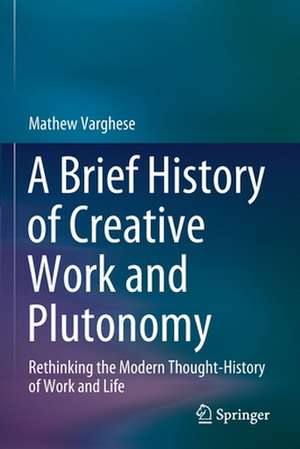A Brief History of Creative Work and Plutonomy: Rethinking the Modern Thought-History of Work and Life
Autor Mathew Vargheseen Limba Engleză Paperback – 12 noi 2021
This book discusses the influence of creative work on human life, and the role it has played in shaping human civilization since antiquity. To do so, it analyzes the history of thought on creative work from three civilizations: Greek, Indian, and Chinese, as well as contemporary neurological studies on consciousness. According to the classical Greeks, humans are instinctively predisposed to use creative work to gain truth, wisdom and happiness; the Indians consider that Dharma (duty, morality, etc.) can be achieved only through work (karma); and for the Chinese, creative work is needed to attain the supreme wisdom (Dao). Modern studies on consciousness show that our brain creates a personal self-model (ego tunnel) when we learn things creatively, and developing such skills provides lifelong protection for the brain.
In the 21st century, human involvement in creative work is declining as we use mechanized systems to gain more and more profit, but thewealth falls into the hands of the few superrich: the Plutonomy. As creative work is taken over by AI systems, human work is reduced to operating those machines, and this in turn leads to an exponential growth in the number of part-time workers (Precariat). The declining value of human life today is a consequence of this change in society. Further, reducing creative work means we have no way to distribute wealth, nor do we have any means to address problems like the lack of enthusiasm in the young; the health crisis due to lack of physical activity; or the environmental crisis due to the high demand for energy to run mechanized systems. This book explores these issues.
| Toate formatele și edițiile | Preț | Express |
|---|---|---|
| Paperback (1) | 387.38 lei 6-8 săpt. | |
| Springer Nature Singapore – 12 noi 2021 | 387.38 lei 6-8 săpt. | |
| Hardback (1) | 394.87 lei 6-8 săpt. | |
| Springer Nature Singapore – 11 noi 2020 | 394.87 lei 6-8 săpt. |
Preț: 387.38 lei
Nou
Puncte Express: 581
Preț estimativ în valută:
74.13€ • 76.96$ • 61.82£
74.13€ • 76.96$ • 61.82£
Carte tipărită la comandă
Livrare economică 24 martie-07 aprilie
Preluare comenzi: 021 569.72.76
Specificații
ISBN-13: 9789811592652
ISBN-10: 9811592659
Pagini: 243
Ilustrații: XXXIX, 243 p. 1 illus.
Dimensiuni: 155 x 235 mm
Greutate: 0.4 kg
Ediția:1st ed. 2021
Editura: Springer Nature Singapore
Colecția Springer
Locul publicării:Singapore, Singapore
ISBN-10: 9811592659
Pagini: 243
Ilustrații: XXXIX, 243 p. 1 illus.
Dimensiuni: 155 x 235 mm
Greutate: 0.4 kg
Ediția:1st ed. 2021
Editura: Springer Nature Singapore
Colecția Springer
Locul publicării:Singapore, Singapore
Cuprins
The structure of Plutonomy: Artificial Intelligence, Plutocrats and Precariats (Part time workers).- Human Life and Creative Work.
Notă biografică
Mathew Varghese works on Middle-Path philosophical thought, and in his works, he ingeniously uses the critical investigation method of employing four-value logical analysis (catuṣkotī). He is a critic of the binary logical interpretation method being followed by many modern thinkers after Hegel. He argues that the problem of absolutes like plutonomy against which we have no intellectual freedom is a problem that originated out of the indiscriminate use of binary logical interpretations. Continued philosophical investigation—skepticism using tetralemma(catuṣkotī) is an original contribution of Indian philosophy since antiquity. He is a textual scholar of Middle Path (Mādhyamika) Buddhist philosophy and published three books and nearly 40 papers. He is a research fellow at The Hajime Nakamura Eastern Institute and also teaches philosophy at Aoyama Gakuin University, Kanagawa University, and Wako University in Tokyo.
Textul de pe ultima copertă
This book discusses the influence of creative work on human life, and the role it has played in shaping human civilization since antiquity. To do so, it analyzes the history of thought on creative work from three civilizations: Greek, Indian, and Chinese, as well as contemporary neurological studies on consciousness. According to the classical Greeks, humans are instinctively predisposed to use creative work to gain truth, wisdom and happiness; the Indians consider that Dharma (duty, morality, etc.) can be achieved only through work (karma); and for the Chinese, creative work is needed to attain the supreme wisdom (Dao). Modern studies on consciousness show that our brain creates a personal self-model (ego tunnel) when we learn things creatively, and developing such skills provides lifelong protection for the brain.
In the 21st century, human involvement in creative work is declining as we use mechanized systems to gain more and more profit, but the wealth falls into the hands of the few superrich: the Plutonomy. As creative work is taken over by AI systems, human work is reduced to operating those machines, and this in turn leads to an exponential growth in the number of part-time workers (Precariat). The declining value of human life today is a consequence of this change in society. Further, reducing creative work means we have no way to distribute wealth, nor do we have any means to address problems like the lack of enthusiasm in the young; the health crisis due to lack of physical activity; or the environmental crisis due to the high demand for energy to run mechanized systems. This book explores these issues.
Caracteristici
Offers insights into the synergy between work and life, not just the socio economic impact of reducing human work Introduces a new phraseology explaining today’s world systems using philosophical ideas on the development of knowledge and consciousness Proposes shifting the current thought from the extreme thoughts of postmodernism to the classical Middle Path ethical thoughts of Aristotle and Nagarjuna
